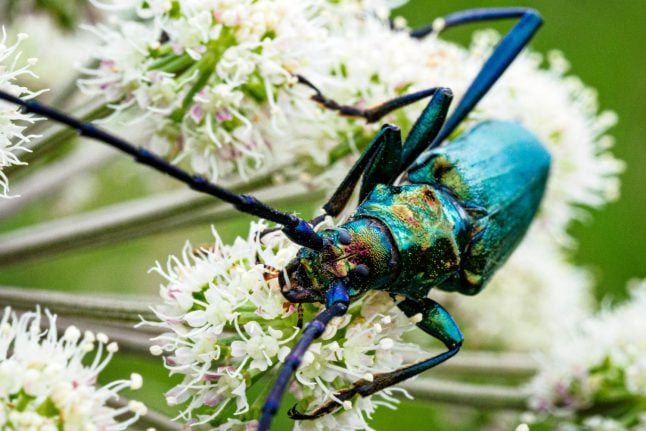The chemical, which is also suspected by some experts to cause cancer in
humans, is to be banned by the end of 2023 when the EU's current approval period for it expires, ministers said.
Biologists have sounded the alarm over plummeting insect populations that
impact species diversity and damage ecosystems by disrupting natural food
chains and plant pollination.
“What harms insects also harms people,” said Environment Minister Svenja
Schulze of the centre-left Social Democrats, warning of a future when fruit
could become a luxury.
“What we need is more humming and buzzing,” Schulze told a press
conference, stressing that “a world without insects is not worth living in”.
READ ALSO: Deutsche Bahn to stop using cancer-linked pesticide on tracks
Farm groups and the chemical industry have lobbied for the continued use of glyphosate, which is sold under the trade name Roundup made by Bayer
subsidiary Monsanto.
Bayer protested Germany's unilateral ban, arguing the chemical can be used safely and is “an important tool for ensuring both the sustainability and
productivity of agriculture”.
After its mammoth takeover of Monsanto last year, Bayer has been battered
with a wave of lawsuits alleging the flagship herbicide causes cancer, with
juries awarding massive damages awards.
The German Chemical Industry Association complained that, with EU
authorities due to re-evaluate glyphosate use in 2022, Berlin was “embarking on a confrontation course with European law”.
Austria became the first EU member to forbid all glyphosate use in July,
with restrictions also in force in the Czech Republic, Italy and the Netherlands. France is phasing it out by 2023.
'Save the bees'
Chancellor Angela Merkel's government presented its plan after heated
internal debate between Schulz and the more industry-friendly Agriculture
Minister Julia Kloeckner of Merkel's centre-right Christian Democrats.

'Save the bees' campaigners in Munich in February. Photo: DPA
In a first phase, glyphosate will be banned from next year in city parks
and in private gardens, according to the policy roadmap which sets the basis for new laws and regulations.
Herbicide and insecticide use will also be restricted or banned in more
species-rich areas such as grasslands and orchard meadows, and along many river and lake shores.
Campaigners worldwide have highlighted the risks of declining insect
numbers, noting they are vital for pollinating plants — including food crops
— and as food sources for birds and other animals.
In February, a record 1.75 million people in the prosperous southern German state Bavaria voted in a referendum to “save the bees”, calling for less chemicals use and more organic farming and green spaces.
The campaign was opposed by the powerful regional agriculture association, which urged the population to “stop bashing farmers”.
However, Bavaria's ruling conservative CSU party then announced it would
turn the referendum into government policy.
READ ALSO: Bavaria to transform landmark 'Save the bees' petition into law
The roadmap presented Wednesday also featured a new voluntary animal
welfare label introduced by Kloeckner which aims to help consumers recognize when buying pork how the pigs are raised.
Activist group Germanwatch criticized the initiative, charging that
consumers would continue to be “misled”, for example by packaging that suggest idyllic farm conditions on meat products that in reality come from industrial feed lots.
The Merkel cabinet also plans to earmark a greater share of EU farm
subsidies it receives to environmental and climate protection, raising the
share from 4.5 percent now to six percent next year.




 Please whitelist us to continue reading.
Please whitelist us to continue reading.
Member comments